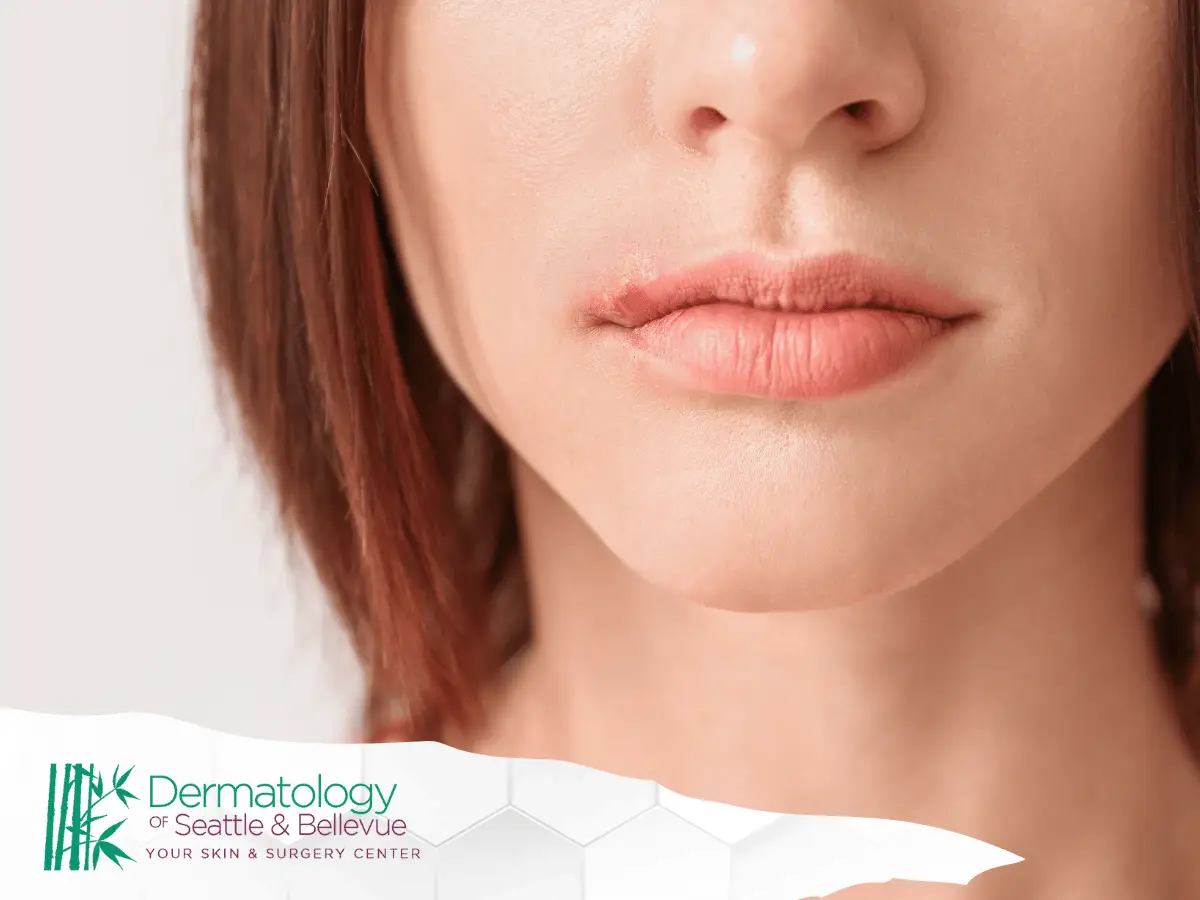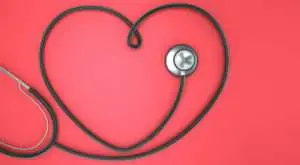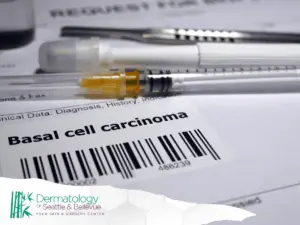Few things are more uncomfortable—or confusing—than sudden sores in or around your mouth. Are they cold sores or canker sores? The two conditions may sound similar, but they differ in cause, appearance, and treatment. Understanding those differences helps you manage outbreaks effectively and know when to see a specialist.
Quick Summary
- Cold sores are contagious HSV-1 blisters on/around lips, often preceded by tingling and crust over in 7–10 days.
- Triggers for cold sores include stress, illness, sun/cold exposure, fatigue, and dental procedures or minor lip injuries.
- Canker sores are noncontagious ulcers inside the mouth with a white/yellow center and red border, healing in 10–14 days.
- Canker triggers include mouth trauma, stress, spicy/acidic foods, dental irritation, and possible nutrient deficiencies or GI issues.
- Cold sores respond best to antivirals; canker sores to topical pain relief and rinses—seek care if severe or persistent.
For Bellevue residents, where seasonal stress and weather changes can affect immune health, learning to distinguish between these two common mouth lesions is an important part of everyday wellness.
Understanding Cold Sores
Cold sores, sometimes called fever blisters, are highly contagious lesions that appear around the lips and mouth. They’re typically small, fluid-filled blisters that crust over as they heal. While not dangerous, they can cause discomfort, embarrassment, and recurring flare-ups.
Cold sores are caused by a viral infection and can spread easily through close contact, such as kissing or sharing utensils. Recognizing their early signs and triggers helps prevent outbreaks and reduces their duration.
Definition and Overview
Cold sores are caused by the herpes simplex virus (HSV-1), a common infection affecting over half of U.S. adults. After the initial infection, the virus lies dormant in nerve cells and may reactivate due to triggers such as stress, illness, or sunlight exposure.
Typical characteristics include:
- A tingling or burning sensation before blisters appear
- Clusters of fluid-filled sores near the lips or mouth
- Crusting or scabbing during healing
Though outbreaks usually resolve within 7–10 days, they can recur multiple times a year without proper care or antiviral medications.
Causes and Triggers
Cold sores are most commonly caused by the herpes simplex virus type 1 (HSV-1), though HSV-2 (typically associated with genital herpes) can also infect the mouth. Once infected, the virus remains in your body for life, reactivating when your immune system is weakened.
Common triggers include:
- Stress or fatigue
- Illness, fever, or hormonal changes
- Exposure to sunlight or cold weather
- Dental procedures or minor lip injuries
Managing these triggers is key to reducing the frequency of outbreaks.
Role of Herpes Simplex Virus
The herpes simplex virus hides in nerve cells between flare-ups, making it nearly impossible to eliminate completely. During reactivation, the virus travels along the nerves to the skin’s surface, causing blisters to form.
For Bellevue residents dealing with recurring cold sores, understanding HSV’s life cycle can help explain why outbreaks seem random—and why antiviral medications are used to control symptoms rather than cure the infection. Regular handwashing and avoiding direct contact during flare-ups also prevent spreading the virus to others.
Cold Sore Triggers
Not every cold sore outbreak is the same, but certain environmental and lifestyle factors tend to set them off more frequently:
- Stress and cold sores: Emotional stress weakens immune defenses, allowing the virus to resurface.
- Weather exposure: Cold wind and sunburned lips both act as triggers.
- Illness or fatigue: A run-down body provides an opening for viral activity.
Keeping a symptom journal can help you identify personal cold sore triggers, allowing you to act early with preventive creams or oral antivirals.
Understanding Canker Sores
While cold sores occur on the outside of the mouth, canker sores develop inside it—on the inner lips, cheeks, or tongue. They aren’t contagious and aren’t caused by a virus, which is one of the main differences between the two.
Canker sores, also known as aphthous ulcers, can be small and shallow or large and painful, sometimes making it difficult to eat or talk. Although they usually heal on their own within one to two weeks, recurring outbreaks may indicate underlying irritation, nutrient deficiencies, or autoimmune factors.
Definition and Overview
Canker sores are noninfectious oral ulcers that appear as white or yellow spots surrounded by red, inflamed tissue. They’re common among teens and adults alike, often triggered by minor mouth trauma or stress.
Unlike cold sores, they don’t form blisters and never appear on the outer lips. Because they’re not linked to the herpes simplex virus, they can’t spread through contact.
Causes and Triggers
The exact cause of canker sores isn’t always clear, but dermatologists and oral health experts recognize several potential contributors:
- Minor injuries from dental work, braces, or biting the cheek
- Stress or lack of sleep
- Acidic or spicy foods
- Hormonal changes or immune response
Certain underlying health issues, like vitamin B12 deficiency or gastrointestinal conditions, can also make people more prone to recurring oral ulcers.
Possible Triggers for Oral Ulcers
Many people notice patterns when their canker sores appear. Paying attention to those can help prevent future outbreaks.
- Diet: Citrus fruits, tomatoes, and salty snacks may irritate sensitive tissue.
- Stress: High-pressure periods often correlate with flare-ups.
- Dental irritation: Ill-fitting retainers or rough fillings can injure the mouth.
If canker sores persist for more than three weeks, grow unusually large, or appear alongside other symptoms, it’s best to schedule an exam at a Bellevue dermatology or oral care clinic to rule out other causes.
Symptoms and Diagnosis
Because cold sores and canker sores look and feel similar at first, distinguishing between them is essential for proper treatment. A dermatologist or oral health provider can usually diagnose the condition by visual examination, though recurrent or severe cases may require lab testing.
In Bellevue and surrounding areas, dermatologists often evaluate patients for underlying factors like stress, immune health, and environmental exposure before recommending a treatment plan.
Identifying Cold Sore Symptoms
Cold sores typically start with a tingling or burning sensation around the lips before blisters form. Over the next few days, the area becomes red and swollen, then develops clusters of small, fluid-filled bumps that eventually crust over.
Other common symptoms include:
- Itching or pain near the lips or nose
- Mild fever or swollen lymph nodes
- Scabbing that lasts about a week
Cold sores usually recur in the same area, often triggered by stress and cold sores or weather changes. Antiviral ointments or oral medications can reduce both the duration and frequency of outbreaks.
Identifying Canker Sore Symptoms
Canker sores, on the other hand, form inside the mouth and never on the skin’s surface. They often start as a small white or yellow ulcer with a red border and cause sharp pain when eating or brushing teeth.
Unlike cold sores, they don’t produce fluid-filled blisters and are not contagious. You may experience:
- Localized soreness or burning
- Pain triggered by acidic or spicy foods
- Difficulty talking or chewing
Most oral ulcers heal naturally within 10 to 14 days, though prescription rinses or numbing gels can help manage discomfort.
Treatment Options
Treatment for cold sores and canker sores varies depending on the cause, severity, and frequency of outbreaks. While both types benefit from soothing care and prevention, cold sores often require antiviral therapy, while canker sores respond best to topical anti-inflammatory or protective treatments.
Bellevue dermatology clinics typically take a two-part approach: relieve immediate symptoms and prevent future flare-ups.
Antiviral Medications for Cold Sores
Because cold sores stem from the herpes simplex virus, antiviral medications are the most effective way to shorten outbreaks and limit recurrence.
Common options include:
- Acyclovir, valacyclovir, or famciclovir (available in topical and oral forms)
- Prescription creams that ease discomfort and promote faster healing
- Early use at the first sign of tingling for best results
For people with frequent outbreaks, preventive (suppressive) therapy may be recommended. Bellevue dermatologists often combine antivirals with cold sore trigger management for lasting control.
Natural Remedies for Cold Sores
Alongside medical treatment, several natural remedies for cold sores can help speed up healing and ease discomfort.
- Cold compresses to reduce swelling and numb pain
- Aloe vera gel for its antiviral and anti-inflammatory properties
- Lemon balm or lysine supplements to inhibit viral activity
- Petroleum jelly to prevent cracking and secondary infection
These approaches work best as supportive care—not replacements for prescribed medication. Consistency, hygiene, and early action are what make the biggest difference.
Canker Sore Treatments
Canker sores usually resolve without prescription medication, but certain treatments can reduce pain and promote healing:
- Over-the-counter topical gels with benzocaine or lidocaine
- Saltwater or baking soda rinses
- Avoiding acidic or spicy foods until healed
If sores are unusually large, recurrent, or accompanied by fever, your doctor may prescribe an oral rinse containing corticosteroids or an antimicrobial agent. These clinic-backed hand eczema solutions for the mouth (figuratively speaking!) help restore comfort quickly.
Prevention Strategies
Preventing future mouth lesions comes down to understanding your personal triggers and maintaining strong oral and immune health. Whether you’re prone to viral cold sores or recurring canker sores, daily care and stress management go a long way toward minimizing flare-ups.
In Bellevue’s cool, occasionally dry climate, hydration and sun protection are especially important for keeping lips and oral tissue healthy year-round.
Managing Stress and Cold Sores
Stress is one of the strongest and most consistent cold sore triggers. When stress hormones rise, immune defenses drop, giving the herpes simplex virus a chance to reactivate.
To manage stress and cold sores, try incorporating simple relaxation habits into your daily life:
- Regular exercise or outdoor walks
- Deep breathing or mindfulness sessions
- Balanced sleep schedules
- Setting aside breaks during busy workdays
Reducing stress won’t eliminate the virus, but it can dramatically reduce outbreak frequency.
Preventing Canker Sores
While the exact cause of canker sores isn’t always known, several steps can make them less likely to return:
- Brush gently with a soft-bristled toothbrush.
- Avoid sodium lauryl sulfate (SLS) in toothpaste—it can irritate oral tissue.
- Eat a nutrient-rich diet with adequate vitamin B12, iron, and folate.
- Stay hydrated and avoid overly acidic foods.
Regular dental checkups in Bellevue can also help identify irritants, misaligned dental work, or habits that contribute to oral ulcers.
Conclusion and Final Thoughts
Distinguishing between cold sores and canker sores can help you take the right steps toward relief and prevention. Cold sores are contagious, caused by the herpes simplex virus, and respond best to antiviral medications. Canker sores, on the other hand, are noninfectious oral ulcers triggered by irritation, diet, or stress.
Understanding what’s behind your mouth lesions means you can act quickly—whether that’s using prescribed treatments, avoiding known triggers, or practicing better oral care.
If frequent sores disrupt your daily life, professional guidance can make a lasting difference. Clinics like Dermatology of Seattle & Bellevue offer personalized treatment plans, helping patients manage symptoms, identify triggers, and strengthen overall skin and mucosal health.
Disclaimer
This article is for educational purposes only and should not replace professional medical advice. Always consult a licensed dermatologist or healthcare provider for accurate diagnosis and individualized treatment.




